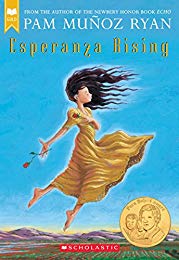
Esperanza grew up in Mexico on El Rancho de las Rosas as the pampered princess and only child of a wealthy rancher. In 1930, a series of events, that began with her father’s murder the day before Esperanza’s twelveth birthday, ended with her mother loosing the ranch. Esperanza had to leave her beloved grandmother, Abuela, and flee to California with her mother and their servants. They landed in Los Angeles, California, where their servants’ family found them agricultural work and a cabin on a six thousand acre farm.
Esperanza went from the easy world of priviledge to a place where she had to prove her value through hard work. Miguel, the son of her servants, knew how to negotiate that world, while Esperanza helplessly tried to find her way. She regretted having once hurt Miguel’s feelings by telling him that the difference in their classes would prevent them from becoming good friends. Now she depended on Miguel’s kindness to help her adjust. Everybody in the camp worked. Her first job was caring for children while their parents worked. She had to learn a new skill, sweeping, as it was her responsibility to sweep the dock where the workers processed produce.
Esperanza learned from Marta, a girl she met from another camp, that the workers were segregated into camps by race. There was a camp for Mexicans, Japanese, Filipinos, and whites from Oklahoma. The conditions in some camps were better than others and Marta wanted the workers to strike for the same conditions. Marta was a political activist trying to get the workers on Esperanza’s farm to join the strike. But strikers were replaced and sometimes beatten and deported.
Her mother adapted to their new life and worked hard, but Esperanza wished for her old life. Her mother became ill after exposure during a dust storm and was hospitalized. Although she was underage, Esperanza went to work with the women to earn money for her mother’s hospital bills. She continued working through the seasons processing different harvests. When her mother finally came home, Esperanza continued working to support her and save money to bring her Abuela from Mexico to California.
Adversity made Experanza strong as she learned to accept her new life and respect her fellow workers. She remembered some advice her Abuela gave her: never be afraid to start over.
The author’s grandmother, Esperanza Ortega, was the inspiration for this novel. Like the heroine of the story, she left a prividleged life in Mexico to start over working on a company farm in California. To learn more about Pam Muňoz Ryan, visit her website at: www.pammunozryan.com
